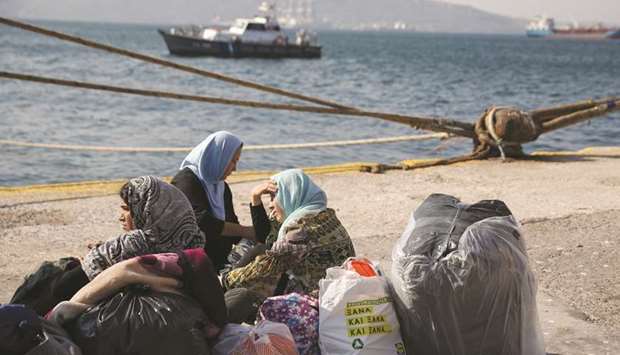The situation for migrants in camps on Greek islands is “explosive” and “on the edge of catastrophe”, the Council of Europe’s Commissioner for Human Rights said yesterday.
Greece has once again become the main point of entry for people seeking asylum in Europe and it is struggling to accommodate them despite the availability of EU funds.
“The situation of migrants, including asylum-seekers, in the Greek Aegean islands has dramatically worsened over the past 12 months,” Dunja Mijatovic told reporters at the end of a five-day visit. “Urgent measures are needed to address the desperate conditions in which thousands of human beings are living.”
“What we see in practice is telling me that human rights are not respected. This is an unacceptable situation,” she said.
With parliament scheduled to approve a tougher new migration law later in the day, the government has said it has some 75,000 asylum requests to process.
Mijatovic said there are an estimated 100,000 refugees and migrants in the country.
Despite regular relocations to the mainland, there are more than 34,000 people in overcrowded Greek island camps.
The government has pledged to move 20,000 of them to camps on the mainland before the end of the year.
Mijatovic, who visited camps on the islands of Lesbos and Samos and in Corinth, said she was “appalled” by the unhygienic conditions in which asylum-seekers live on the islands.
“There is a lack of medical care and sanitation in the vastly overcrowded camps I have visited. People queue for hours to get food and to go to bathrooms, when they exist,” she said.
“On Samos, families are chipping away rocks to make some space on steep hillsides to set up their makeshift shelters, often made by trees they cut themselves. This no longer has anything to do with the reception of asylum-seekers. This has become a struggle for survival.”
Mijatovic urged Greek authorities to accelerate transfers out of the islands and boost local hospitals which are currently unable to handle the strain.
She also called on other EU states to help in more ways than just financially, by accepting more asylum-seekers, particularly unaccompanied minors who now number more than 4,000.
“The solidarity Greece needs is not there ... I’m talking about real actions, other European countries taking the responsibility as well,” she said.
“People are suffering tremendously. It’s not something I can continue watching without raising my voice ... what I can assess is that there is not enough political will” among “certain” other EU states, the commissioner said. “In a way, we are failing to show that Europe is still a place where human rights are respected. It’s not just Greece.”
In her home country of Bosnia, there are some 10,000 asylum-seekers in a camp near a minefield, Mijatovic said.
Greece’s new conservative government, which took over in July, has vowed to tighten asylum rules, step up naval patrols to deter migrant boats and to send 10,000 people back to Turkey next year.
There have been clashes between different migrant groups and between migrants and the police.
The Greek parliament is due to adopt a new migration law enshrining the policy changes, but Mijatovic says the draft she saw “raises concerns from a human rights perspective”.
Human rights groups have also criticised the bill, saying that it introduces stricter rules for receiving asylum-seekers, delays access to the right to work, narrows the definition of family, and imposes more burdens on torture victims in being recognised as such.

This picture taken on October 22 shows refugees and migrants waiting to be transferred to camps on the mainland, at the port of Elefsina, near Athens.
